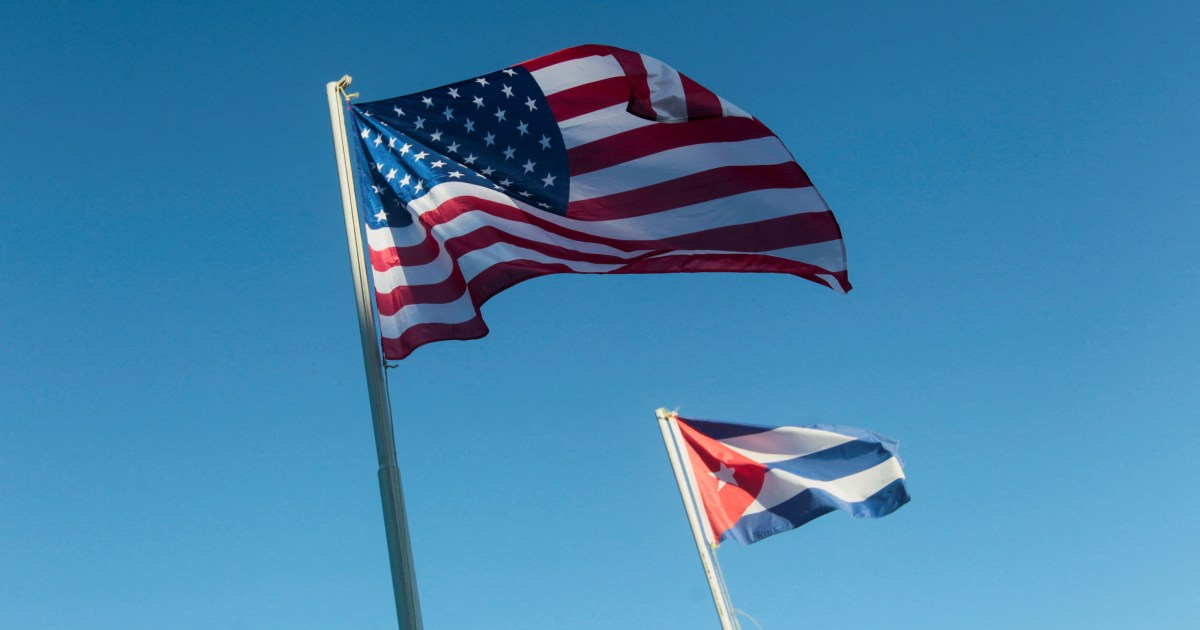
US says measures, including loosening curbs on family remittances and travel, aim to ‘support Cuban people’.
Published On 16 May 2022
The United States is easing some restrictions on Cuba, including curbs on family remittances and travel to the Caribbean island nation.
The measures, announced on Monday, comes after a lengthy US government review and ease some of the restrictions imposed during former President Donald Trump’s administration.
They mark the most significant changes in Washington’s approach to Havana since President Joe Biden took office in January of last year.
In a statement on Monday, the US Department of State said Washington reinstate a family reunification programme known as the Cuban Family Reunification Parole and continue to boost the capacity of its consular services.
It will also expand authorised travel, increase support for Cuban entrepreneurs, and “ensure that remittances flow more freely to the Cuban people while not enriching those who perpetrate human rights abuses”.
The changes aim to “support the Cuban people, providing them additional tools to pursue a life free from Cuban government oppression and to seek greater economic opportunities”, said Ned Price, spokesperson for the Department of State.
There were few details on how the new policy would be implemented, but officials said the steps would be implemented over coming weeks.
Cuban Foreign Minister Bruno Rodriguez, in a Twitter post, called the US announcement “a limited step in the right direction”.
“The decision does not change the embargo, the fraudulent inclusion (of Cuba) on a list of state sponsors of terrorism nor most of the coercive maximum pressure measures by Trump that still affect the Cuban people,” he said.
Tensions persist
The announcement comes just weeks after the US embassy in Cuba in early May began issuing visas for the first time in four years.
That came shortly after senior US and Cuban officials held their highest-level diplomatic talks after a severe disruption in ties during the Trump administration.
The discussions in Washington, DC, in April between senior Department of State officials and Cuba’s deputy foreign minister focused on migration, with the US side eager to rein in a growing number of Cubans trying to enter the country.
But tensions between the two nations persist, including over the Cuban government’s crackdown on protests last year and continuing US sanctions against the country.
Cuba’s foreign minister also recently accused the Biden administration of exerting pressure on countries in the region to try to exclude Havana from the upcoming Summit of the Americas in Los Angeles, California.
“There is no justification for excluding Cuba or any other country from this event that we have attended the last two editions,” Rodriguez said on Twitter last month.
A US delegation is travelling to Mexico later this week to discuss the June summit, after Mexican President Andres Manuel Lopez Obrador last week warned that if Cuba, Nicaragua and Venezuela are excluded, he would skip it and send a representative instead.
In its Monday statement on Monday, the Department of State said the US would lift the cap on family remittances, previously set to $1,000 per quarter, and authorise donative remittances to non-family members.
But it made clear that the US would not remove entities from the Cuba Restricted List, a State Department list of Cuban government- and military-aligned companies with whom US firms and citizens are barred from doing business.
The US will use civilian “electronic payment processors” for remittances to avoid funds going directly to the Cuban government, am administration official said earlier in the day, adding that the US had already engaged with the Cuban government “about establishing a civilian processor for this”.
Washington will aim to issue 20,000 immigrant visas a year, the official said, in line with a migration accord, and expand authorised travel to Cuba, allowing scheduled and charter flights to use airports other than Havana.
It will also reinstate some categories of group educational travel, as well as certain travel related to professional meetings and research.
Individual “people-to-people” travel, however, will not be reinstated. The category was eliminated by Trump officials who said it was being abused by Americans taking beach vacations.
The US will also increase support for independent Cuban entrepreneurs, the Department of State said, aiming to ease access to the internet and expanding access to microfinance and training, among other measures.
Source
:
Al Jazeera and news agencies
